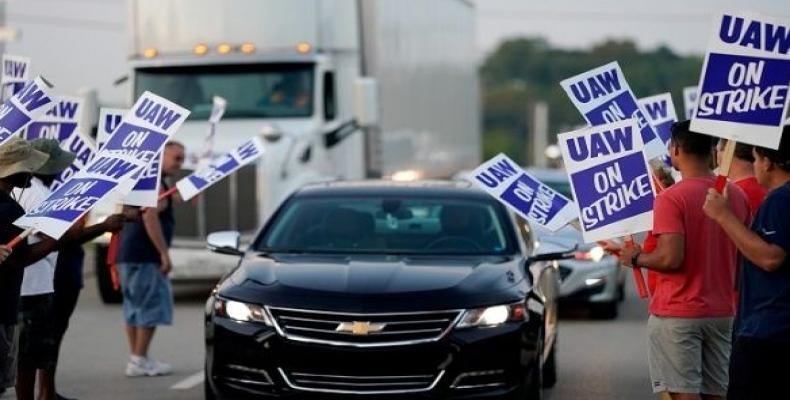Detroit, October 10 (RHC)-- The United Auto Workers (UAW) union’s top negotiator in talks with General Motors Co (GM) to resolve a more than three-week strike said a key issue separating the two sides is job security. The strike has cost GM more than $1 billion so far and forced it to idle operations in Canada and Mexico.
“We have made it clear that there is no job security for us when GM products are made in other countries for the purpose of selling them here in the U.S.A.,” UAW Vice President Terry Dittes wrote in a letter to UAW officials on the 23th day of the strike. “We believe that the vehicles GM sells here should be built here. We don’t understand GM’s opposition to this proposition.”
The strike at the United States’ biggest carmaker began on September 16, with its 48,000 UAW members seeking higher pay, greater job security, a bigger share of the automaker’s profit and protection of healthcare benefits.
GM declined to comment on the UAW letter, which the union released to the media.
GM’s production of trucks and sport-utility vehicles in Mexico has drawn anger among union workers. Through August, 526,000 of the 573,000 vehicles GM exported from Mexico were sent to the United States, equal to about a quarter of its U.S. sales.
GM announced in November 2018 it would close four U.S. factories, including two assembly plants, and cut 15,000 jobs in North America.
UAW workers are concerned that as GM shifts to more electric vehicles it will require fewer workers and that battery production may result in workers getting paid less than at existing transmission plants.
About 75,000 employees of auto parts suppliers have either been temporarily laid off or have seen their wages shrink due to the slump in demand from GM, according to the AEG report. About 5,000 workers at Michigan auto suppliers have filed for unemployment benefits as a result of the strike, the state said Tuesday.
AEG estimates that the strike has resulted in a US$660 million profit hit for GM and more than US$412 million in direct wage losses for all employees through the third week of the strike. Talks for a new four-year labor contract took a “turn for the worse” Sunday after the UAW rejected GM’s latest offer but the two sides were still talking.


